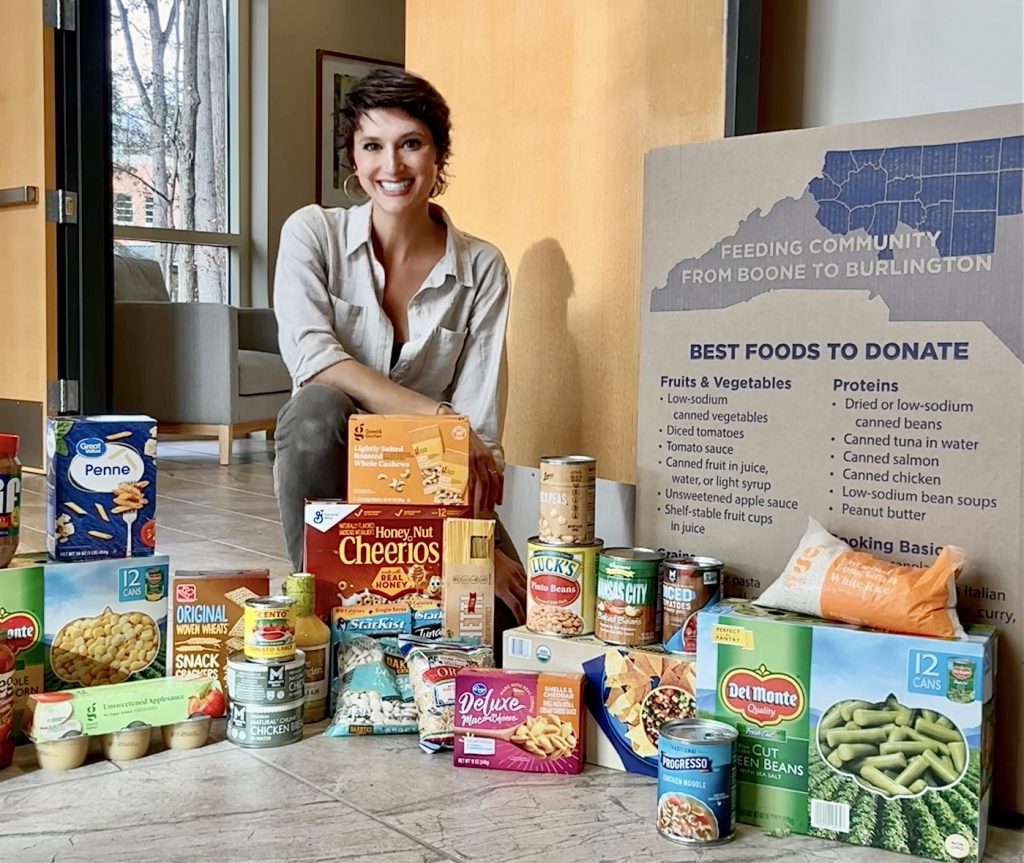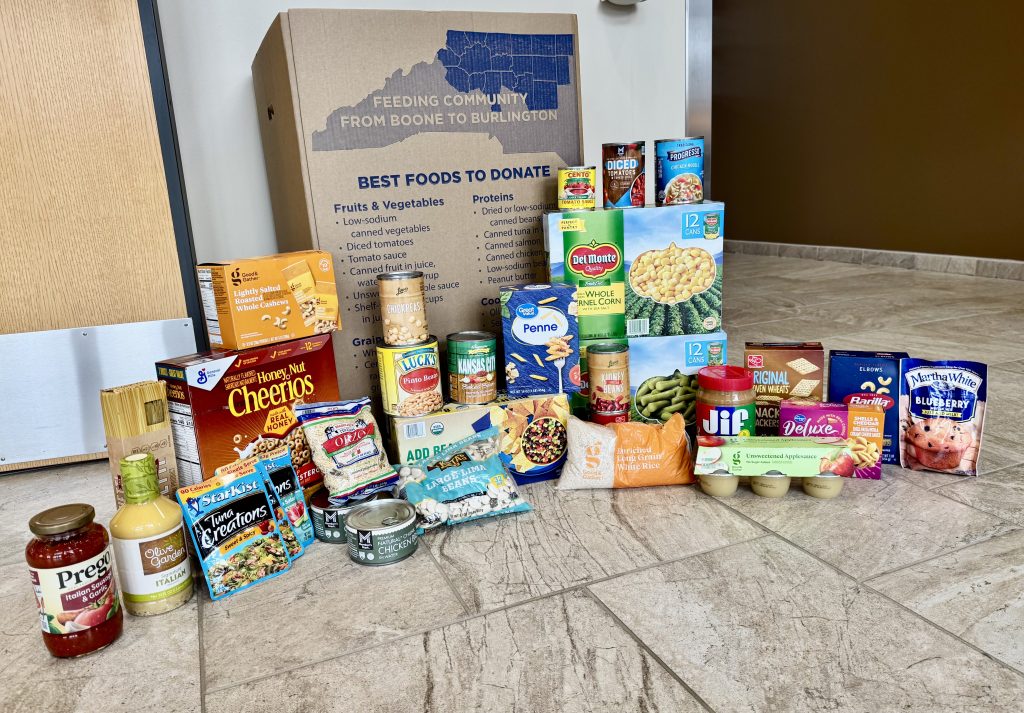Professor Megan Bennett launches ambitious SPICE-D study to address food insecurity
For nearly four years, Megan Bennett has served as an assistant professor in Health and Exercise Science at Wake Forest. Yet her commitment to public health—and her two decades of research on chronic disease interventions—extends far beyond the classroom. This month, she’s launching her most ambitious project yet: Supporting People through Inclusive Cultural Eating for Diabetes, or SPICE-D. Bennett recently received an Academic Community Engagement (ACE) Fellowship, which will provide targeted support for the SPICE-D project.
“The goal is not simply to complete a study, but to build infrastructure and partnerships that will continue serving families long after the formal research period concludes, with the huge hope that we can put a dent in food insecurity right here at home,” said Bennett.

Bennett partnered with Christopher Dietrich (’26), a member of the Health and Exercise Science Honors Program and a longtime volunteer at the Forsyth County Community Care Clinic (CCC). Sophomore Estefani Merida Lopez (’28) also works closely with Bennett, supporting outreach to the Hispanic and Spanish-speaking community, as more than 70% of CCC patients are Spanish speakers.
CCC is a non-profit that provides healthcare services to the uninsured and underserved. When Bennett contacted CCC, she quickly recognized the struggles facing many of the clinic’s Hispanic population. Bennett wrote the SPICE-D study to examine the scope and impact of food insecurity among the clinic’s 3,800 patients, and to explore the relationship between food insecurity and comorbid conditions, such as type 2 diabetes. A second component of the study involves shopping for and delivering culturally-tailored food bundles, recipe resources, and nutrition education to food-insecure patients with diabetes over three months, beginning in mid-December and running through the Spring.
“The issue of food insecurity is not merely a social problem, but a health crisis with cascading consequences,” said Bennett.
Food insecurity worsens diabetes control, poor glycemic management leads to complications and hospitalizations, causing medical costs to strain household budgets, which forces families to make even more difficult tradeoffs between food and healthcare. “The connection between nutritional instability and chronic disease is well-established, and we’re seeing this play out in real time at the CCC, where approximately 60% of patients are diabetic or prediabetic,” Bennett added.
Up to 25 CCC patients are participating in the food delivery program, and with additional funding, Bennett hopes to expand the program to reach more patients in the community. Bennett views the food insecurity portion of her work as part of a broader commitment to student-led research that addresses critical health disparities in Winston-Salem.
Bennett’s passion extends beyond the SPICE-D study to ways she can make a lasting impact on Wake’s campus.
“I believe our responsibility as a university extends far beyond the production of knowledge — it encompasses a moral imperative to act when our neighbors are struggling to meet their most basic needs. It is the very essence of what pro humanitate is all about.”
In response to recent federal budget cuts and the growing number of food-insecure citizens in Forsyth County, Bennett partnered with Brad Shugoll from the Office of Civic and Community Engagement (OCCE) and Stephanie Bunch to launch a campus-wide food drive to support the Second Harvest Food Bank of Northwest North Carolina.
Not only is the food drive positively impacting those in need, but it is also offering a more nuanced understanding for Bennett’s students of how structural inequities shape health outcomes. Bennett shared, “They learn that chronic diseases like diabetes are not simply the result of individual choices but are deeply rooted in systems that limit access to nutritious food, safe housing, living wages, and quality healthcare.”
Ways to make a difference during the 2025 holiday season and beyond

There are many ways the Wake Forest community can help those in need – from donating food to making an online monetary donation, to volunteering and helping with the SPICE-D research study.
Because families across Northwest North Carolina are struggling more than ever, the Second Harvest Food Bank is working with over 515 on-the-ground partner programs serving 18 counties in Northwest North Carolina.
1] Donate food
Non-perishable food items can be placed in Second Harvest Food Bank boxes located throughout campus, including the HES building and multiple Greek life locations. There is a strong need for hygiene products, baby diapers and formula, and culturally-appropriate foods, such as rice, beans, chiles, spices, cooking oil, and canned vegetables. Groups can also fill a Second Harvest Food Bank box or raise and donate $500 to support Second Harvest Food Bank.
2] Make monetary donations
Any donation helps to feed a hungry family, from a $15 Family Food Box, a $12 Senior Food Box, a $5 Kids Food Backpack, or a one-time or ongoing monthly monetary donation; every dollar helps our neighbors in need. Learn more about making online Second Harvest Food Bank donations.
3] Consider volunteer options
From food sorting to serving meals, the Second Harvest Food Bank locations in Winston-Salem and Greensboro are always looking for volunteers to lend a helping hand. Sign up for one or more shifts at a Second Harvest location.
4] Research study volunteer opportunities
To engage more deeply with the SPICE-D study, from preparing culturally-tailored food bundles to translating nutrition education materials into Spanish, assisting with data collection and analysis, and helping with transportation needs, interested students can email Bennett at irbym@wfu.edu. Volunteers will receive training on cultural humility, HIPAA compliance, and community-engaged research ethics.
5] Longer-term assistance
Students interested in sustained involvement can explore opportunities through campus organizations, courses with community-engaged learning components, internship possibilities, and honors thesis partnerships. The Health Policy and Administration minor, in particular, emphasizes community partnerships and offers pathways for students to integrate coursework with meaningful service and research experiences addressing health equity. Email Bennett at irbym@wfu.edu to learn more.
Categories: Community Impact, Pro Humanitate, Research & Discovery
